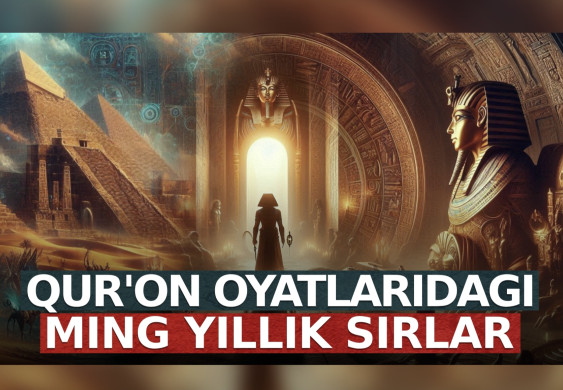Unseen messages in the Qur'an (video)
If a person who does not know how to read or write at all tells a message about the unseen, it is certain that it will not come out right. If we divide the unseen into the future and the past, it is absolutely impossible to predict the future. As for speaking from the past, unless it is a well-known and popular story, this is only possible through literacy and the study of historical works. So, let's say that you saw a person who was giving signs of the future, who, despite being completely illiterate, was also telling about the past and what he said was correct. Is it reasonable to doubt that this person is the Prophet of God and that the book in which these messages are written is the Book of God? No, not at all! Because no one can know the unseen except Allah and the one whom He has taught.
In this section of our work on the fact that the Qur'an is the Book of God, we will show the truth of the messages of the Qur'an from the unseen. We prove that it is the word and word of God. We will begin our demonstration with the verses of Surah Rum, the message of the Qur'an about the victory of the Byzantine army.
Victory of Rome
"Alif, Lom, Mim." Rum (army from Persia) was defeated in very close quarters. (But) they (i.e. the Romans) after their defeat, will definitely win (over the Persians) in a few years. The work before and after is God's. On that day, the believers will rejoice (over the victory of the Romans)" (Sura Rum, verses 1-4) .
Let's dwell on the evidence that this verse refers to. Between 613 and 614, pagan Persians crushed the army of Christian Byzantium . The polytheists of Makkah rejoiced over the defeat of the People of the Book Christians and said to the Muslims: "If God, as you say, is the only winner, He would have given victory to Rum, the People of the Book, and won over the Persians." The Qur'an then miraculously foretold a future event that seemed impossible at the time: in three to nine years, Rome would conquer Persia, and the Muslims would rejoice...
Relying on this promise of God, Hazrat Abu Bakr said to the polytheists who rejoiced at the defeat of the Persians: "Allah will not prolong your joy." Because He said that in a few years the Romanians will win." Ubayy ibn Khalaf heard this and offered to play a bet. Ten camels were pledged for three years. Abu Bakr, may God bless him and grant him peace, told the Messenger of God, may God bless him and grant him peace. He said: "The word 'we' in the verse means between three and nine years, not three years." This time, nine years were fixed for the pledge, and a hundred camels were sacrificed. In fact, it is mentioned in the "Sahih" of Tirmidhi: in the days of the Battle of Badr, the Romans defeated the enemy in the battle with the Persians. In this way, the unseen message of the Qur'an was confirmed. Hazrat Abu Bakr took the camels from the heirs of Ubay ibn Khalaf and distributed them to the poor according to the recommendations of the Prophet.
Now let's take a closer look at the situation of Rum at that time and witness the miraculousness of this message conveyed by the Qur'an. The condition of the Byzantine Empire was so bad that it was unlikely to survive, let alone defeat the Persians. Iran defeated the Byzantines in Antioch in 613, captured Syria, Cilicia, Tarsus, Armenia and Jerusalem. At the same time, not only Persians, but also Avars, Slavs and Lombards threatened Byzantium. Emperor Heraclius ordered the gold and silver ornaments in the churches to be melted down and made into money to cover the expenses of the army. This was not enough, bronze statues began to be melted down to generate money. Many governors rebelled, and the empire was on the verge of collapse. The Persians completely occupied Byzantium.
So, while everyone was waiting for the collapse of Byzantium, as we said earlier, the first verses of Surah Rum were revealed. Byzantium was reported to be victorious again in three to nine years. This victory was so difficult to achieve that no one except the Muslims believed. However, like all the prophecies in the Qur'an, this also came true. In 622, Heraclius won many victories over the Persians and conquered Armenia. In December 627, a great battle took place between the armies of Rome and Iran. Rum defeated the enemy. A few months later, the Persians were forced to sign an agreement to return their captured territories to Byzantium.
In this way, "Rum's victory" mentioned in the Qur'an by Allah, the Exalted, took place in the term " in a few years ", i.e. "between three and nine years", as mentioned in the verse.
Imagine a person saying, "I am the Messenger of God and this is His Book." There are very few people who follow him among the Sarkash people. The most interesting thing is that this person is bravely reporting about the issue that is completely impossible to believe will happen. In addition, he clearly states the time and place. The unbelievers around are shocked. Even some of them, who strongly believe that this will not happen, want to bet with the believers. If the fortune-telling does not come true, the other person's claim to prophethood will fail. But he stands firm.
Now look, if this incident happens after a period of time, would you have the slightest doubt that the person who brought the good news is not the same person and that the book he brought is the word of God? Of course not! Because only Allah and those whom Allah has taught know the unseen. Just as it is impossible for a person to be aware of the unseen, it is also impossible for him to predict the future.
Another miracle in these verses is that a geographical fact was reported that no one could determine at that time. In verse 3 of Surah Rum, it is said that the Romans will be defeated in the deepest, lowest place of the earth. The Arabic phrase "adnal-ard" is translated in many places as "very near". But this phrase is not translated directly from Arabic, but in a figurative sense, and does not convey its original meaning. "adna" is the intensified form of the Arabic word "dani" "the lowest, the lowest"; "ard" means "ground, ground level". That is, the phrase "Adnal-ard" means "the deepest, lowest place of the Earth." When it is translated as "very close" it means that this area is very close to the lands of Arabia.
This expression refers to an important geological fact that no one could have known at the time when the Holy Qur'an was revealed. The fact is that experts have determined that the deepest low point of the Earth is the basin of Lake Lut, the place where Byzantium was defeated by Iran in 613-614. The Romanians and Persians fought in this area where the lands belonging to Syria, Palestine and Jordan intersected. Located 395 meters below sea level, the area around Lake Lut is the lowest place on Earth.
It is impossible to determine the lowest point in the world without scientific research. It is impossible for a human child to learn this truth by himself. Therefore, a question arises: "How can we explain the fact that the truth, which was proven by the most advanced technologies of our time, was stated in the Qur'an 1400 years ago?" Even in this case, can we still call it not the Book of God, but the word of mankind?" We cannot say no. Because in this we close our eyes to the truth and deny the truth.
Ancient Egyptian writings and Haman
"Pharaoh said: "O people! I do not know for you any deity other than myself. So, O Haman! Bake the clay and build a tall tower for me ! Perhaps I will see the god of Moses. I think he is one of the liars." (Qasas Surah, verse 38) .
The name Haman, along with the one in this verse, appears in six places in the Qur'an. In verses 6 and 8 of Qasas Surah, in verse 39 of Surah Ankabut, in verses 24 and 36 of Surah Ghafir, the name Haman is mentioned and it is stated that he is Pharaoh's minister.
Who is Hamon? Is he related to Pharaoh? What do the history books say about this?
Hieroglyphs were used to write words in ancient Egypt, and the Hittites, Mayans, and Aztecs also used hieroglyphics. Hieroglyphs consist of pictures and conventional symbols. This type of writing is very complex, despite an attempt to give meaning to the images.
During the occupation of the Roman Empire, the history and language of Egypt changed completely. Adopting Christianity as its official religion, Rome imposed strict restrictions against the beliefs of Ancient Egypt, which it considered pagan. Temples were destroyed, inscriptions were erased, hieroglyphics were banned. After 300 years, this writing was forgotten, and there was no one left on earth who could read it. It continued until the eighteenth century. What was reflected in the inscriptions in the Egyptian papyri and inscriptions remained unknown. The situation changed in 1799 when a soldier in the French army that conquered Egypt dug a trench and found an inscription known as the Rosetta Stone. The distinguishing feature of the find was that it was written in both hieroglyphic, demotic (handwritten form of hieroglyphic) and Greek. Since it was possible to read Greek, the French scientist Jean-Francois Champollion determined the meaning of the hieroglyphs based on it. In this way, a lot of information about Ancient Egypt and Pharaoh came to light. An important aspect of our topic is that the inscriptions do indeed contain the name Haman. This name is also present in the exhibit kept in the Hof Museum in Vienna, and it is noted that he is one of Pharaoh's relatives. This was reported by Walter Wrezinski, a German scholar who studied the culture and history of Ancient Egypt, whose writings are considered the masterpiece of Atlas.
Another Egyptologist, Herman Ranke, in his New Kingdom dictionary, based on all these inscriptions, calls Haman the "supervisor of the quarrymen."
In fact, Haman, as mentioned in the Qur'an, lived in Egypt during the time of Moses. As mentioned in the verses, he was very close to Pharaoh and managed the construction works. The verse that informs about Pharaoh's order to Haman to build a tower is very compatible with this archaeological find.
Our Prophet, peace be upon him, was illiterate, he could neither read nor write. And in the Qur'an, a person who lived in Ancient Egypt and served as a minister to Pharaoh is mentioned by name, and this is the same as the historical information found 200 years ago. The pages of Moses also tell us that a man named Haman was a contemporary of Pharaoh and was engaged in construction work as his minister.
What can be explained by the miraculous mention of this message, which could not be obtained at the time when the Qur'an was revealed, and the fact that this information is reflected in the records of Ancient Egypt? The only explanation for this is that the Holy Qur'an is a Book revealed by Allah, the One who knows the unseen best!
Pharaoh's drowning
"For your sake , remember that We divided the sea (into twelve lanes) and saved you, and drowned Pharaoh's army before your eyes" (Baqarah, verse 50) ;
"So, (We) "retaliated" against them - We drowned them in the sea because they lied to Our verses and were heedless of them" (Surah A'raf, verse 136) ;
" (This is) like the cases of Pharaoh's nobles and those before them, when (they) belied the revelations of their Lord, We destroyed them because of (these) sins and drowned Pharaoh's nobles (in water). They were all oppressors" (Surah Anfal, verse 54) ;
"Then when (Pharaoh) tried to drive Moses and his people from there, We drowned him (Pharaoh) and all those who were with him (in the sea)" (Surah Isra, verse 103) ;
"So, when the two groups saw each other (from a distance) , the companions of Moses said: "We have definitely been overtaken." (Moses) said: " No, I have my Lord with me. Indeed, He will guide me (safely ) . So We said to Musa: "Strike the sea with your rod!" We sent a revelation. So (the sea) was divided, and each part (of the water rose up) became like a great mountain. We brought others (Pharaoh and his army) close to that (way). We saved Moses and all those who were with him . Then We drowned others (in the sea)" (Surah Shu'aro, verses 61-66) .
This verse of the Holy Qur'an informs about the end of Pharaoh through verses. He says that he drowned in the sea along with Lashkari. Now let's pay attention to another verse: "You were not a reciter of a book before, and you did not write a letter with your hand." Otherwise, the miscreants would have doubted" (Surah Ankabut, verse 48) . As it is clearly stated here, our Prophet, peace be upon him, did not know how to read or write. So, where did they get the news about the pharaoh who lived centuries before them and that he drowned in the sea? Well, let's leave that for later and move on to another question: Did Pharaoh really drown? Does history confirm the Qur'anic information about his death?
In the British Museum in Great Britain, an inscription on Egyptian papyrus number 6 from the time of the Pharaohs contains the following sentences: " From Amenamone, keeper of the white room of the palace, chief of the books, to the scribe Penterhor:
When this letter reaches your hands and is read from cover to cover, let your heart be in violent agony like a leaf caught in a storm when you learn of the sad disaster of drowning. Calamity befell him suddenly and inevitably. Sleep in the water rendered the creature helpless. Picture the death of the chief, the destruction of the ruler of nations, the king of east and west. What other message can be compared to my message to you? "
In this text, it is clearly stated that the Pharaoh of Egypt drowned in the sea. That is, the Egyptian papyrus number 6 confirms the message in the Qur'an. Therefore, we return to our initial question: how did a person who did not write or read a single letter know about the death of a person who lived centuries before him? How can we answer this question if we do not accept the Qur'an as the Book of God? Or can we say "coincidence"? No, coincidence is no substitute for an answer. There is an answer to this question and it is as follows: The Holy Qur'an is a Book revealed by Allah Almighty, who knows all times from the beginning to the end of time. The Almighty revealed the events that happened in the past and will happen in the future as miracles in the verses of the Qur'an.
What do those who deny that the Qur'an is the Book of God explain the miraculous drowning of Pharaoh and other unseen messages in the verses? Not recognizing the Qur'an as the Book of God is turning a blind eye to the truth and denying the truth. The accuracy of the unseen reports is a confirmation that the Qur'an is the Book and word of God.
The plagues that befell Pharaoh
"We subjected Pharaoh's people to years of (famine) and scarcity of fruits, so that they would receive a severe reminder" (Surah A'raf, verse 130) ;
"Then We sent upon them floods, locusts, lice, frogs, and blood as clear miracles. (Then) they became arrogant . (They used to be) a people of criminals" (Surah A'raf, verse 133) .
In the above and other verses of the Qur'an, the calamities that befell Pharaoh and his people are mentioned. Floods, locusts, lice, frogs, and plagues are listed. In other words, the Almighty sent a severe rain to the people of Pharaoh, who did not stop denying. Eight days and eight nights of rain prevented anyone from going out, the Nile overflowed, and the torrential flood washed away houses, crops, and animals. During the calamity, Pharaoh's servants came to Hazrat Musa and said: "Pray to your Lord, remove this calamity from us and we will follow you." Musa, peace be upon him, fulfilled their request and with the blessings of his prayers, the flood subsided. But the people still did not believe. He did not take a step back from his path.
After that, Allah sent the plague of locusts as a sign and a miracle. The hordes of pests that have eaten the harvest of fields and gardens have entered people's houses and even their clothes. The weak ones rushed to Moses again and repeated what they had said before. With the blessings of Hazrat Musa, the wind came and threw the locusts into the river. However, Pharaoh and his people, who were blind in heart, did not keep their promise.
This time Haq Ta'ala afflicted the people with lice. Insects that ate what was left of the locusts would get into people's clothes and suck their blood. The apparitions came for the third time and said that if they were saved from the calamity, they would believe in Moses. After the prayer of Hazrat Musa, Allah Almighty repelled the insects. And the people went so far as to say to the Prophet of God, "You are a sorcerer, you are doing all this with your magic", let alone believing.
This time there was fear everywhere. Knowing that the solution to salvation is Hazrat Musa, the courtiers pleaded and said that now they will truly believe. The rain that fell after the Nabawi prayer took all the frogs to the sea. Did the people believe? Of course not! In this way, they brought the plague of blood upon themselves, blood came out from everywhere, even from their drinking water.
We listen to the accounts of the history books about these events, which are given to us as an example in the Holy Qur'an.
At the beginning of the nineteenth century, the Ipuwer papyrus from the Middle Kingdom period is found. In 1909, it was taken to the Leiden Museum in the Netherlands, and its content was clarified by English Egyptologist Alan Gardiner. Ipuver, who wrote this papyrus, says the following about the events he witnessed: "Catastrophes engulfed the whole country. Blood everywhere, the river too. Everything I saw yesterday was perfect. The land is empty, as if driven out... The lower parts of Egypt have turned into nothingness. The whole palace was deserted. we have nothing left: no wheat, no barley, no geese and no fish, everything is gone...
For nine days no one came out of the palace, no one could see the face of that person.
Strong currents made the cities one with the land. Upper Egypt is in ruins. There is blood everywhere, infectious diseases are spreading in the country.
Today, no one can go north to Byblos. What will happen to our mummies? Running out of gold...
People were afraid of water. He is thirsty while drinking water. Here is our water! Here we go! What could we do? Everything is ruined. Cities fall. Upper Egypt dried up. Within a minute, the places of residence turned into ruins . "
As you read this information that you were able to read in the 20th century, you remembered the familiar verses, didn't you? The reason for this is that the writings on the papyrus are very similar to the verses of the Qur'an and confirm the messages in the Qur'an.
Then the question becomes: Is it possible to explain the correspondence of the information in the papyrus, which talks about the disasters sent to Pharaoh and his people, with something other than the fact that the Qur'an is the Book of God? Is it believable for an illiterate person to talk about such things on his own? Absolutely! A human child cannot discover these things with his own mind. Therefore, the Qur'an cannot be the word of a holy man. It is the word of Allah Almighty, the Sultan of eternity, who is able to see the past and the future as if they were one page.
Noah's flood
"We sent Noah (as a prophet) to his people. So he stayed among them for fifty years, less than a thousand years. So, while they were oppressors (infidels), the flood (calamity) overtook them. Then We saved him (Noah) and his companions in the ark (from the scourge of the flood) and made him an example to (all) the worlds" (Surah Ankabut, verses 14-15) .
The verses mentioned above and in other chapters tell us about the great flood that happened on earth. So much so that it covered a large part of the earth and destroyed a certain civilization.
I wonder what scientists say about this message in the Qur'an. Will he admit that there really was such a flood? What are your views on the subject? Below we will discuss how this phenomenon was proven by experts.
If it is lost once a thousand times, that is, as a result of a natural disaster, a rapid migration or a battle, traces of it are preserved much better. Because in such cases, the places where people lived, the things they used in their daily life are buried under the ground for a short period of time and are kept untouched for a long time. And after it comes to light, it gives important information about the past.
A number of arguments related to Noah's flood also appeared in this way. A flood that occurred about three thousand years before Christ destroyed the entire Hazara in one moment and opened the way for a completely different civilization to take its place. In this way, evidence related to the event has been preserved for thousands of years for us to learn from.
A number of excavations have been carried out to study the flood that covered the plain of Mesopotamia. Major Mesopotamian cities in the region, Ur, Uruk, Kish, and Shuruppak, have been found to show signs of a violent flood. Archaeological excavations show that these cities were flooded approximately three hundred thousand years ago.
British archaeologist Leonard Woolley led excavations in the desert between Baghdad and the Persian Gulf in collaboration with the British Museum and the University of Pennsylvania. "Rider's Digest" describes Woolley's research as follows: "Depth in the excavation area, a very important find was discovered - the tomb of the kings of Ur." Archaeologists have come across legendary works of art in the tombs of Sumerian kings and nobles. Spears, swords, musical instruments, jewelry made of gold, precious stones...
The workers went down another meter through the mud-covered bricks and began to extract the finds. And then everything suddenly stopped. There was nothing to this oil, only pure mud that had brought water, only...
Woolley continued to dig. They went down through a layer of two and a half meters of clay, and the workers saw fragments of stoneware, bowls and pots made by people of that time. It was clear that under the clean mud there was a Hazara. All this was a confirmation of the flood in the region. Microscopic analysis also showed that the thick layer of clay was deposited by a large and violent flood of the level that destroyed the ancient Sumerian civilization.
At the end of the excavation, Sir Woolley concluded: "Such a large layer of mud formed at the same time indicates an extremely powerful flood. It could be the remnants of the legendary Noah's flood.'
The German archaeologist Werner Keller expresses the results of this excavation in the following way: "In the research conducted in Mesopotamia, the discovery of city remains under the clay layer proved that there was a flood here."
Now let's take a look at the messages of the Qur'an 1400 years ago about the global flood recognized by scientists:
It was revealed to Nuh: " None of your people will believe anymore except those who have believed (until now). So don't worry about what they are doing! Build the ark with Our observation and revelation (command) and do not cry out to Me (for protection) about the wrongdoers ! Indeed, they are the drowning ones!'" (Surah Hud, verses 36-37) ;
" As it (the ark) carried them in waves like mountains, Noah called his son (Kan'an) who was standing on the edge and said: "O my son! Get on (the ship) with us ! Do not be with the disbelievers!” He (his son) said: " I will seek refuge (by going) to a mountain that will protect me from the water." (Noah) said: "Today there is no (power) to save from the commandment of Allah except those on whom He has mercy ." (At that time) a wave came between them and (the son) was among those who drowned. (Then) it was said: “O Man! Drink your water! O sky! Hold on (stop raining!) ” The water dried up, the order was fulfilled and (the ship) landed on (Mountain) Juvdi and “Woe to the people of the oppressors!” It was not said" (Surah Hud, verses 42-44) .
What does it mean that the Qur'anic message and the conclusions of scientists agree so much? What do those who deny that the Qur'an is the word of God explain the fact that it announced this flood 1400 years ago? Can a human child tell about a flood that happened thousands of years ago as if he had seen it? Do those who accept the word of scientists as evidence in other matters close their eyes and close their ears in front of such a scientific revelation about Noah's flood?
The truth is that science has once again confirmed the Qur'an, and scientists have proven the correctness of the information in the Qur'an with their conclusions.
We will conclude with a request: a person who was a ummi, leaning on a book in his hand, gave a sign as if he saw the flood that happened centuries ago. Then, hundreds of years later, this news was researched and confirmed by all the historians and archaeologists of the time. Even then, is it right to doubt that this person is a prophet of God who knows the past and the future, and the book in his hand is His decree?
The city of Iram
What would you think if a person who has never read a book or written a single letter speaks as if he witnessed a civilization hidden in the dark layers of the earth, and this news is confirmed by the research of scientists fourteen centuries after the time he lived? And which of the following possibilities would you accept:
1. This person transcended time and space, went to the age of that people, then returned to his own time and told what he saw. But common sense does not accept this.
2. He is the messenger and prophet of God, who created time and space, and whose knowledge covers every time and space. He knows the truth by the revelation of the Almighty and He reveals it by the revelation of the Almighty. This is a good option because there is no other choice to accept.
In fact, there are not two ways, but one. Even if this is the case, it is to believe that he is definitely the prophet of God.
Now we bring you a miraculous message that proves that the decree in his hand is the Book of God: " Didn't you see what your Lord did to Od (tribe)?! (They are) from (the city of) Iram with high pillars , and its like has not been created in (other) lands" (Surah Fajr, verses 6-8) .
At the beginning of 1990, the famous publications of the world reported about a very unique archaeological find. He published articles with titles such as "The legendary Arab city was found", "Ubar - the Atlantis of the sands". The aspect that increased the importance of this finding was that it was mentioned in the Qur'an. Until then, those who claimed that the people of Od were a myth or did not exist at all were shocked. Nicholas Clapp, an inexperienced archaeologist, Arabic scholar, and documentary filmmaker, discovered this city named in the Qur'an. In 1932, he read the book "Arabia Felix", i.e. "Bakhtiyar Arabia" by the English researcher Bertram Thomas. This is the name given by the Romans to the region in the south of the Arabian Peninsula, which now includes Yemen and Oman.
British researcher Bertram Thomas organizes a trip to the coastal area of Oman where the ruins of the city of Ubar, inhabited by the Od people, have been found. At that time, the Bedouins living in the desert showed him a very old path and told him that it would lead to the ancient Ubar. Clapp, who studied the writings of Bertram Thomas, used two different approaches to prove the existence of the city described in the book. The first Bedouin found the trail and asked NASA to provide a satellite image of the area. Later, he began researching ancient manuscripts and maps at the Huntington Library in California. After a short search, he found a map drawn by the Egyptian-Greek geographer Ptolemy in 200 AD. The map shows the location of the old city found in this area and the roads leading to it. In the meantime, the photos taken by NASA with the help of a satellite revealed traces of roads that could not be seen directly with the naked eye, but could only be seen as a whole from above. The roads in the photos and on the old map were consistent, and the large area where they ended indicated that there had once been a town here.
In this way, the location of the legendary city, which is the subject of Bedouin oral stories, was discovered. During the excavations, the remains of an ancient city began to emerge from the sands, and they were the real evidence that proved that the "Atlantis of sands - Ubar" belonged to the people of Od, mentioned in the Qur'an. From the first encounter, it became clear that the ruins were Iram's pillars. Dr. Juris Zarins, a member of the excavation team, said that the feature that distinguishes this city from other archaeological finds is its tall pillars. Therefore, it is Iram, the city of the people of Ad mentioned in the Qur'an.
" Didn't you see what your Lord did to Od (tribe)?" (They are) from (the city of) Iram with high pillars , and its like has not been created in (other) lands" (Surah Fajr, verses 6-8) .
Conquest of Makkah
In verses 27-28 of Surah Fath, it is said: "I swear, Allah made his prophet's dream come true, surely you (believers!) will safely enter Masjid al-Haram with your heads (hair) shaved and (or) cut short" you will enter without fear, inshallah. So (Allah) knew what you did not know, and before it (the conquest of Makkah) he made a near victory (the victory of Khaybar) . He is the One who sent His Prophet (Muhammad) with guidance and the True Religion (Islam) to make it (religion) victorious over all religion (s). Allah himself is a sufficient witness .
When the Prophet, peace be upon him, was in Madinah, he saw in his dreams that the believers were entering the Holy Mosque and circumambulating the Kaaba. They told this good news to the companions. Because Muslim immigrants could not go to Makkah since they emigrated.
Allah Almighty revealed the 27th verse of Surah Fath as a help and support from His presence and said that the dreams are true and that if He wills, the believers can enter Makkah.
Indeed, after some time, the peace of Hudaybiya was concluded, followed by the conquest of Makkah. Believers entered Masjidul Haram without any danger. In this way, he found confirmation of the two unseen messages mentioned in the verse. The Muslims conquered Makkah and the true religion Islam was victorious over all religions.
But one thing should not be forgotten and the verses should be approached from the following point of view. It's easy to herald spring at the beginning of spring. But in the middle of winter, it is difficult to predict from the chest. The messages in the Qur'an are like watering a spring in the middle of winter.
After all, at the time these verses were revealed, the Muslims were very weak and lacking in numbers. They were forced to emigrate, leaving their homelands and their homes. Even when they came to visit the Kaaba, they returned to Madinah sad because the Meccan polytheists did not give permission. It was at this time that the Qur'an announced that they would enter the Kaaba in safety and that Islam would triumph over other religions, and it became a reality.
The people of Saba and the broken dam
" There was a sign (of God's grace) for the people of Saba in their dwellings - gardens on the right and on the left. We said to them : "Enjoy the provision of your Lord and be grateful to Him! (We said) (your city) is a pure city, (your Lord) is a forgiving Lord . So when they turned away (from gratitude), We sent upon them the (blocked) flood with a dam (blocked) and We turned their gardens into "gardens" of bitter fruits, brambles and sparse bushes. We punished them with this (punishment) because they disbelieved . Would We punish anyone other than a disbeliever?'' (Sura Saba, verses 15-17) .
The Qur'an tells about the people of Saba and the flood that befell them because of their famine. It tells in detail how the disaster happened. The disaster expressed in the Qur'an as "saylul arim", that is, "arim seli" also means the form of its arrival on the field by its name.
The meaning of the word "Arim" is "dam" or "barrier". "Sailul Arim" means a flood caused by a dam failure.
Now let's talk about how historians confirmed the information about the people of Saba in the Qur'an.
The Saba community was one of the four major Hazaras that existed in South Arabia. Historical sources say that this people engaged in commercial activities like the Phoenicians. Words such as "repair", "consecrate", "build" are found in the writings of the rulers. The Ma'rib Dam, one of the most important monuments of the people, is a manifestation of their high level of technology. With the construction of this structure, the people of Saba achieved a great achievement in terms of irrigation. They lived comfortably because of the control over the fertile soil and trade routes. The area irrigated by this dam in Marib was 9,600 hectares, 5,300 hectares of which were in the valleys in the south and the rest in the north. They are called "Marib and two valleys" in the inscriptions of Saba. The phrase " gardens on the right and on the left " in the Qur'an may refer to the beautiful gardens in these valleys. In the shadow of this dam, the region became known as the best irrigated and most productive part of Yemen.
The French historian Holevy and the Austrian archaeologist Glaser proved that the Marib dam existed from ancient times through written documents. Documents written in the Himer dialect state that this dam is the reason for the fertility of the country's soil. The flood caused by its destruction destroyed everywhere. The walls built by the people of Saba to block the middle of the mountains, the canals they dug, were destroyed, and the irrigation system failed. As a result, like a green garden, the land became a place for wild grass, and there was no fruit left but the cherry-like fruit on the bushy trees.
Also, there were inscriptions written in Saba language on the surface of the pillars belonging to the people. The Christian archaeologist Werner Keller, who studied them, says in his book "The Holy Book was True": "The flood of Arim happened as stated in the Qur'an. Because the fact that such a dam existed and broke down and destroyed the whole city confirms the truth of the parable of the gardeners in the Qur'an."
Here we would like to draw your attention to the following points:
1. The Qur'an stated that the people of Saba lived in the past, historians accepted;
2. The Qur'an mentioned that the people of Saba lived in green fields and gardens, historians confirmed it;
3. The Qur'an mentioned that there was a large dam in this city, historians accepted;
4. The Qur'an said that this dam watered two gardens, and historians also recognized this, saying "Ma'rib and two valleys";
5. The Qur'an mentioned the flood disaster that occurred as a result of the dam failure, historians did not deny it;
6. The Qur'an reported that the garden and flower beds were destroyed after the flood, historians accepted.
These confessions mean that historians have confirmed that the Qur'an is the Book of God by accepting the above scientific truths. After all, it is impossible for an illiterate person to discover and report these things by himself.
Our question is, how do those who say that the Qur'an is the word of a man explain that these messages he conveyed from the Prophet are true? Can they suppress the booming voice of the Qur'an, which says "I am the Book of God" with the same characteristic, with their voices like the buzzing of flies?
The death of Abu Lahab as a disbeliever
"May the hands of Abu Lahab wither (perish) !" He died. He did not lose his possessions and what he earned . Soon (he) will burn in the flaming fire. Also, the woodcarrier's wife. There will also be a well-woven rope around his neck" (Surah Masad, verses 1-5) .
His real name was Abduluzzo, and the Holy Qur'an gave him the name Abu Lahab, which means "Father of the Blazing Fire". His wife Umm Jamil collected thorny branches every night, tied them around her neck, and scattered them on the roads where the Prophet, peace and blessings be upon him, was walking.
Much has been written about the cruel oppression of these two to Muslims. Therefore, we will talk below about the message from the unseen in this surah and its correctness.
Surah Masad foretold that Abu Lahab and his wife would die as polytheists, and so it happened. And this is to report from the unseen. An ordinary person does not know the unseen, the future, and cannot determine the fate of someone. As such, the Qur'an is the word of God, which tells about the future.
Now let's take a closer look at this argument. The Holy Qur'an says that Abu Lahab and his wife will die without faith and go to hell. How would a denier who does not accept that the Qur'an is the book of Allah answer these questions:
1. Abu Lahab died seven years after the revelation of Surah Masad. That is, the verses of this sura were not revealed when Abu Lahab was on his deathbed. Bil'aks described its consequences after seven years. If the Qur'an is not the book of Allah, how did the common man know that Abu Lahab would die as a disbeliever?
2. People who were hostile to Islam at the beginning became Muslims one by one and pledged allegiance to the Prophet. Among them were Khalid ibn Walid, Abu Sufyan, Amr ibn As, who fought with the believers, Hazrat Vahshi, who killed Hazrat Hamza, and Hazrat Hind, who ripped out Hazrat Hamza's heart. All of them repented and took a place among the people who are remembered with the status of "Hazrat" and "Sahaba". Abu Lahab and Umm Jamil naturally did not have such an opportunity. However, in the language of the Qur'an, it was announced that the couple would die in disbelief. I wonder, if Hazrat Muhammad, may God bless him and grant him peace, is not the Prophet of God and the Qur'an is not the Book of God, how did he know the ugly end of Abu Lahab and his wife?
3. A wise person does not make a claim on a matter that exposes him to a liar. When the topic is about the unseen, he does not even open his mouth. Think about it, the Holy Qur'an says: "Abu Lahab and his wife will go without faith." If one of these two says: "I repented, I became a Muslim", then the message of the Qur'an is a lie. Even if they hypocritically said, "We have believed," the integrity of the Qur'an and the Prophet, peace and blessings of God be upon him, would be damaged. In other words, if they claim to be Muslims when the Qur'an says that they will die as infidels, how would you interpret this message of the Qur'an? In such a serious situation, the Qur'an said that Abu Lahab and his wife would die in disbelief, and this message became true seven years later. If the Qur'an was not the word of God, but a book made by man, would that person have made such a claim, knowing that the lie would be exposed? Of course not! so, how do you explain this message and its confirmation other than that the Qur'an is the Book of God?
The Qur'an said, "He will die as an infidel" and in seven years it came true. Despite his fierce hostility, he cannot say, even if it is just, "I believe." He can't pronounce the word faith, even if it's a lie. Knowing this only and only comes from being aware of time and space simultaneously, and this quality is unique to none other than Allah.
It is mentioned in the verses that Abu Lahab and his wife will die as polytheists, and we cite the fact that this happened as proof that the Qur'an is the word of Allah, who knows the unseen best.
The presence of the Messenger of God under the protection of God
The fact that our Prophet, peace be upon him, is under God's protection is stated in verse 67 of Surah Ma'ida: "May God protect you from (harm) of people."
The Messenger of Allah, may God bless him and grant him peace, migrated to Medina before this verse was revealed. The Jews said to him: "O Muhammad, we are many, we have many weapons, if you do not give up your claim and religion, we will kill you." After that, one hundred people from the Ansar and the Muhajir guarded the Prophet. Fearing the assassination of the Jews, they would spend the night with eyes and ears, and they would walk with them wherever they went. After the above verse was revealed, the Messenger of Allah, may God bless him and grant him peace, said: "O people, go to your places, do not guard me anymore, surely Allah will protect me from people."
After the promise of God Almighty, our Prophet used to wander alone in the valleys of Madinah when it was dark, even at midnight. Those who intended to commit suicide could not achieve their goals.
In other words, this message given by the Qur'an from the future was also correct, no matter how much the enemies wanted, they could not touch our Prophet, peace be upon him.
Protection of the Qur'an
No one can change even one letter of the Qur'an. "Certainly, We have sent down this dhikr (i.e. the Qur'an) and We are its guardians" (Surah Hijr, verse 9) .
A very weak, lonely person standing in front of a hostile crowd and saying: "Neither you nor those after you can change a single letter of this decree in my hand." The biggest dream and desire of the people is to destroy that decree, or at least to change it. I wonder if the fruitlessness of these plans and attempts is not enough proof that the order in his hand is the book of God?
Yes, Allah the Almighty has promised to protect the Qur'an with the verse: "Surely, We have sent down this remembrance (i.e. the Qur'an) and We are the guardians of it." Despite the fact that fourteen centuries have passed since the revelation of the Qur'an, and despite the fact that there are many enemies of the Holy Word, no one has been able to do anything or change it. The minds and hands that edited the other heavenly books, the Injil and the Torah, could not reach the Qur'an. Like other occult messages about the future, the correctness of this message about the "unchangeability of the Qur'an" proves that the Qur'an is the word of God and Muhammad, may God bless him and grant him peace, is the prophet of God.




.png)












